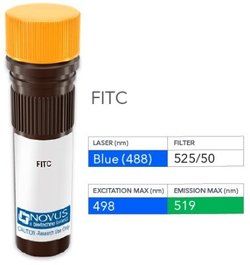Cytokeratin 7 Antibody (OV-TL12/30) - IHC-Prediluted, Novus Biologicals™
Manufacturer: Novus Biologicals
Select a Size
| Pack Size | SKU | Availability | Price |
|---|---|---|---|
| Each of 1 | NBP248115-Each-of-1 | In Stock | ₹ 47,704.00 |
NBP248115 - Each of 1
In Stock
Quantity
1
Base Price: ₹ 47,704.00
GST (18%): ₹ 8,586.72
Total Price: ₹ 56,290.72
Antigen
Cytokeratin 7
Classification
Monoclonal
Conjugate
Unconjugated
Formulation
10mM PBS and 0.05% BSA with 0.05% Sodium Azide
Gene Symbols
KRT7
Immunogen
OTN 11, ovarian carcinoma cell line
Purification Method
Protein A or G purified
Regulatory Status
RUO
Primary or Secondary
Primary
Test Specificity
It recognizes an intermediate filament protein (IFP) of 55kDa, which is identified as cytokeratin 7. This monoclonal antibody is highly specific to cytokeratin 7 and shows no cross-reaction with other IFPs. Cytokeratin 7 is a basic cytokeratin, which is found in most glandular and transitional epithelia but not in the stratified squamous epithelia. Keratin 7 is expressed in the epithelial cells of ovary, lung, and breast but not of colon, prostate, or gastrointestinal tract. This monoclonal antibody is highly useful in distinguishing ovarian carcinomas (keratin 7+) from colon carcinomas (keratin 7-).
Content And Storage
Store at 4C.
Isotype
IgG1 κ
Applications
Immunohistochemistry, Immunohistochemistry (Paraffin)
Clone
OV-TL12/30
Dilution
Immunohistochemistry, Immunohistochemistry-Paraffin
Gene Alias
CK7, CK-7, cytokeratin 7, Cytokeratin-7, K2C7, K7keratin, 55K type II cytoskeletal, keratin 7, keratin, type II cytoskeletal 7, keratin-7, MGC129731, MGC3625, Sarcolectin, SCLkeratin, simple epithelial type I, K7, type II mesothelial keratin K7, Type-II keratin Kb7
Host Species
Mouse
Molecular Weight of Antigen
55 kDa
Quantity
7 mL
Research Discipline
Cytoskeleton Markers
Gene ID (Entrez)
3855
Target Species
Human, Mouse
Form
Purified
Description
- Cytokeratin 7 Monoclonal specifically detects Cytokeratin 7 in Human, Mouse samples
- It is validated for Immunohistochemistry, Immunohistochemistry-Paraffin.


